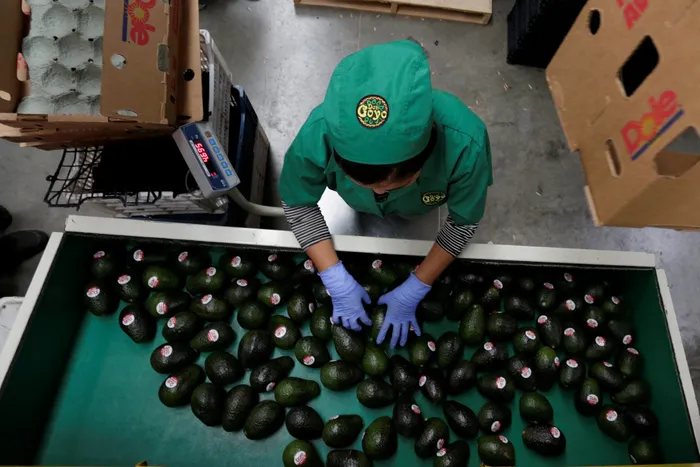Key markets likely to boost SA’s trade in 2024

The avocado industry will undoubtedly benefit from exports to China and Japan, which is anticipated to result in an increase in exports. South Africa has signed protocols with both countries to exports avocados, says the author File: Photo
By Thabile Nkunjana
Towards the end of the 6th administration, several international export markets were opened as stated by Agriculture Minister John Steenhuisen in Parliament recently. Considering that South Africa’s agriculture sector is focused on exports, this is significant.
Opening markets is even more important given the need to reform the sector due to the rise in emerging farmers who are ready for the market, improved farming practices, and the adoption of new technology that have enhanced yields and productivity across multiple industries.
The following markets, which South Africa sealed in the latter months of the previous administration, must be maintained and will be key in keeping South Africa’s agricultural export earnings on a positive trajectory.
This is crucial for retaining thousands of jobs in the agricultural sector, contributing to the country’s gross domestic product, and expanding on the established traditional markets.
Beef exports to China and Saudi Arabia
With projected imports of 2.6 million tons or $17 billion (R315bn) of frozen beef in 2022, China is the world’s top importer. Prior to the outbreaks of foot-and-mouth disease (FMD), South Africa was a supplier of beef to China; but China temporarily stopped importing beef from South Africa.
After negotiations, China decided to lift the ban on South African beef imports in late 2023, designating some areas as FMD-free zones and permitting them to export beef products to China. Considering the scale of the Chinese market and the rising beef production in South Africa, this was a significant move.
China imported 41 000 tons of fresh/chilled beef and 1.9 million tons of frozen beef per year on average between 2018 and 2022. It should come as no surprise that China sources most of its frozen beef from the largest meat exporters in the world. In 2022, Brazil supplied 42% of China’s frozen beef needs; followed by Argentina (19%); Uruguay (13%); New Zealand (8%); and the US (6%); and South Africa will have to compete with these countries.
In August, 2023 the Saudi government announced that it would lift a 21-year ban on the importation of red meat from South Africa. The ban was removed following satisfactory inspections of South African feedlots and abattoirs.
All things considered, Saudi Arabia has a big market potential for South African beef. Due to countries like Kuwait, Jordan, the United Arab Emirates, Qatar, China, and Bahrain, Asia and the Middle East are already significant markets for South African beef, hence a familiar market.
In 2022, Saudi Arabia imported 136 673 tons of beef, comprising 39 043 tons of fresh or chilled meat and 97 630 tons of frozen beef. The amount of frozen beef imported by Saudi Arabia rose from 67 000 tons in 2018 to 97 000 tons in 2022 – a 43.8% rise.
Conversely, imports of fresh/chilled beef increased by 51.3% – from 25 000 tons in 2018 to 39 000 tons in 2022.
South Africa’s beef exports amounted to 29 718 tons in 2023 and were valued at $156.5 million.
Avocados exports to China and Japan
South Africa exported 60 000 tons of avocados a year on average between 2018 and 2022, with 89 000 tons exported in 2018. The avocado industry will undoubtedly benefit from exports to China and Japan, which is anticipated to result in an increase in exports. South Africa has also signed protocols with both countries to export avocados.
The quantity of avocados imported from China rose from 32 000 to 60 000 tons between 2019 and 2023. Chinese avocado imports were worth R2.7bn in 2023, and its great news that South African producers will get a piece of this market.
Japan on the other hand imports more avocados annually than China does – between 2018 and 2022; Japan imported an average of 71 642 tons, whereas China imported 37 329 tons during the same time period. Japan and South Africa decided to trade avocados towards the end of 2023.
Japanese avocado imports totalled R2.9bn in 2023. Although agreements have already been made, South Africa will face competition from countries like Peru in the Japanese avocado market. Nonetheless, the country will get a share of that market.
Oranges to Vietnam
In March, 2024 South African and Vietnam singed a new bilateral protocol following a period of negotiations between the two countries. This was welcomed news ahead of the 2024 citrus export season, as Asia and the Middle East are growing in importance as markets for South Africa.
Vietnam is one of the countries that has seen a rapid increase in imports of oranges, whose imports range from 20 000 tons in 2018 valued at R216.5 million to 44 000 tons valued at R647.1m in 2022. This represents an increase of 198% in rand value.
Establishing new markets is not easy, especially for governments since countries often pause talks to address particular requirements for short periods of time. It takes months to talk alone before moving on to other things, like reaching market norms.
The aforementioned markets will certainly benefit South Africa, but this will depend heavily on the country’s main supporting infrastructure, like ports, railways, and roadways to see meaningful gains. The persistent threat of biosecurity challenges will be some of the key things the new agricultural minister needs to focus on.
Nkunjana is a senior agricultural economist at the National Agricultural Marketing Council, he writes on his personal capacity.
BUSINESS REPORT